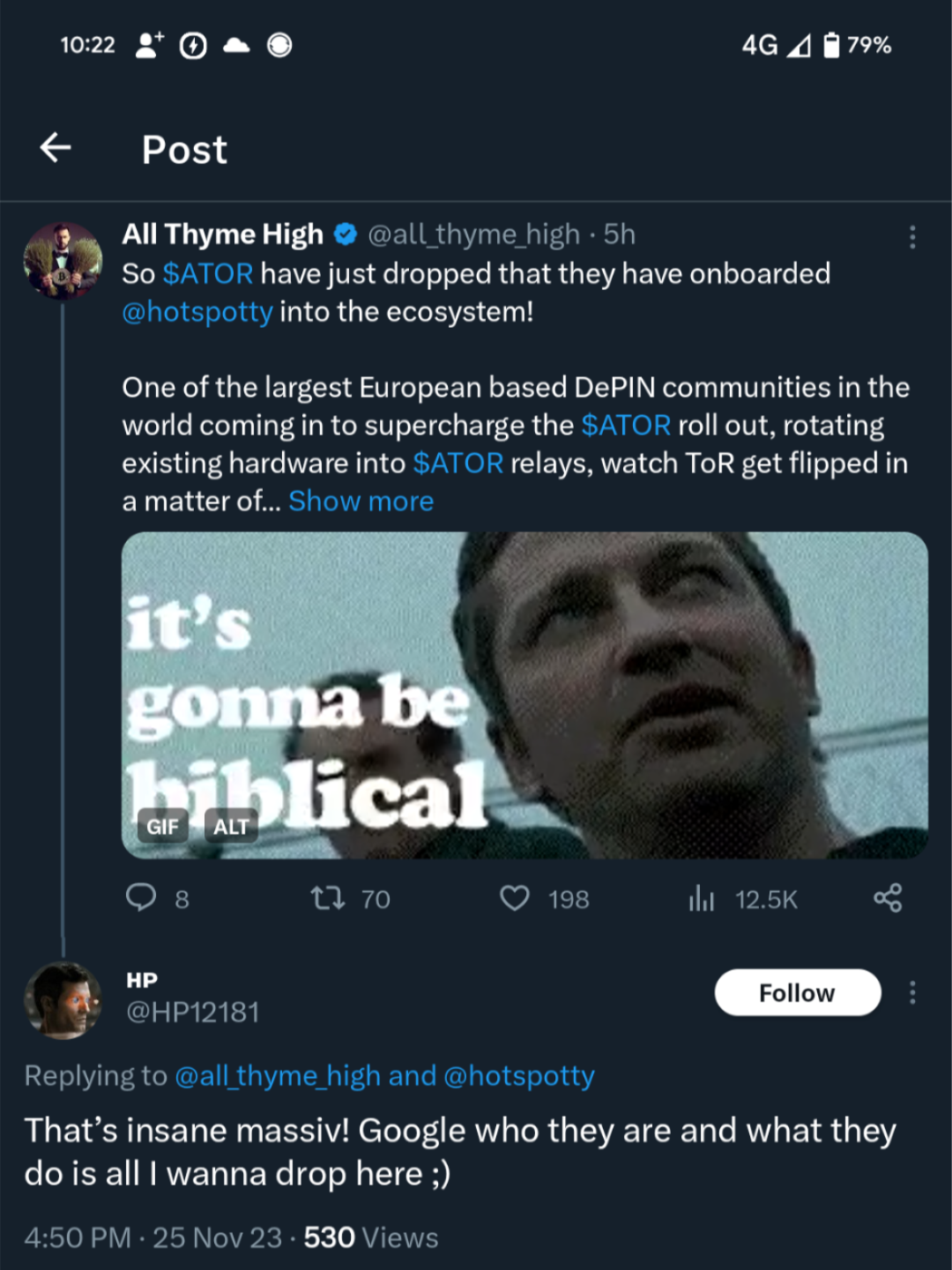
Welcome back to another issue of the DePIN Hub newsletter! 🚀
Lock in for this one, because this week saw a whole lot of action and we had to work to pack it all in.
🌪️ Drama in the TOR community and a big shakeup in the DePIN world…
🎙️ The first episode of the DePIN Hub podcast…
💻 A very DePIN Cyber Monday sale…
🌟 It’s a miracle we found room to cover a few projects on the side!
This week is an even mix of big announcements and detailed write ups on a few passive income opportunities, so join in and read on. Welcome to DePIN Hub Issue #2.
In this issue:
- DePIN Hub Leaderboards
- Cyber Monday Special: The first deal on DePIN hardware, exclusively for newsletter subscribers
- Introducing the DePIN Hub Podcast: Featuring Remy from 2blox
- ATOR & Hotspotty Partnership Announcement: A partnership between Hotspotty and ATOR that could turn the deep web on its head
- Idea of the Week
- Closing Thoughts
DePIN Hub Leaderboards
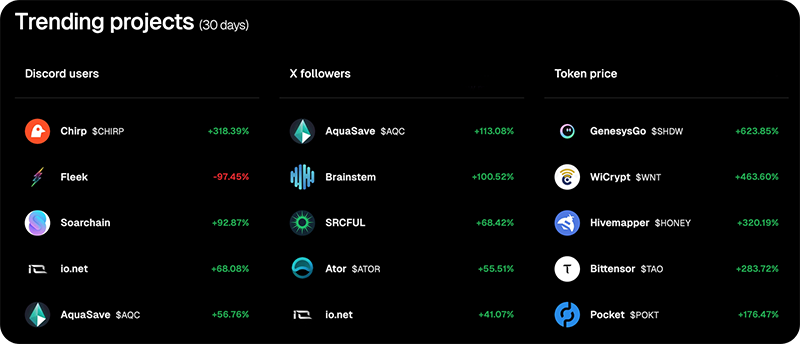
Cyber Monday Deal! 🤑
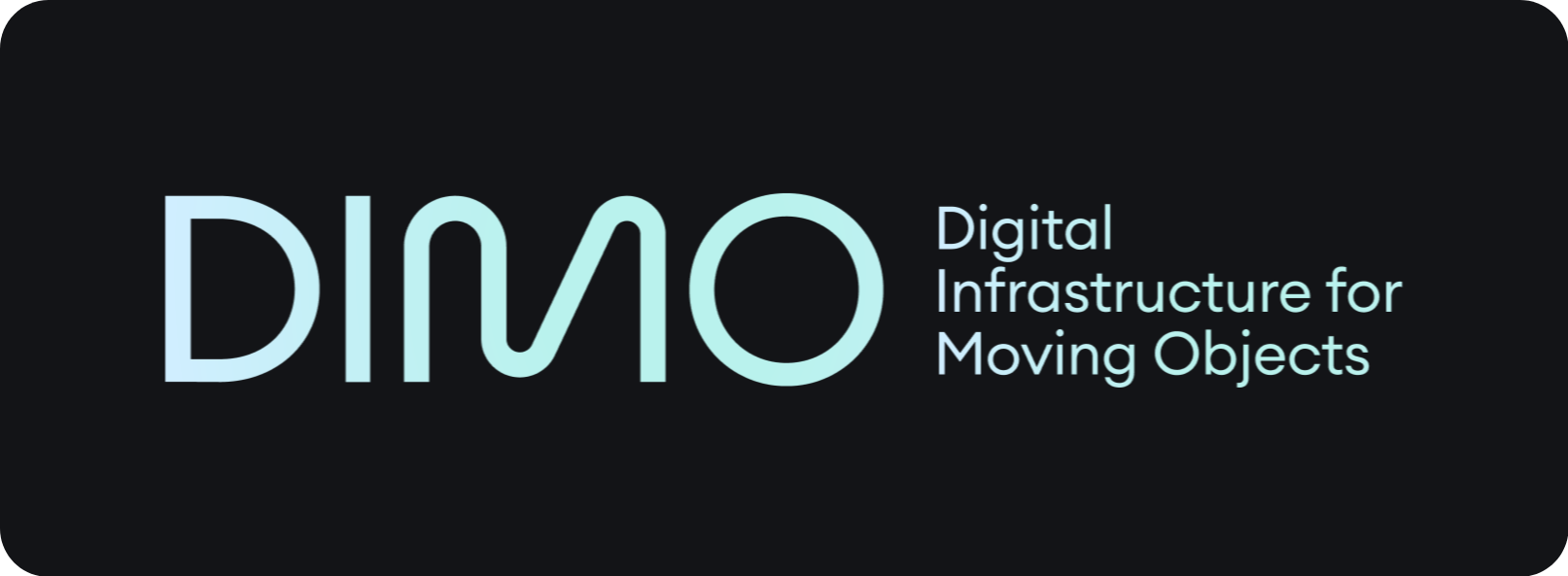
Just in time for Cyber Monday, we’ve secured our first deal exclusively for DePIN Hub subscribers: a buy one get one half-off special on DIMO’s newest device, the Macaron!
If you’ve been following the DePIN space, you probably already know about DIMO. They’re a platform for sharing vehicle data with insurance companies, repair shops, fleet owners, or the resell market so they can learn about how any specific vehicle functions over time. Conveniently enough, their devices also double as a personal monitor for your car’s health and performance.
Their newest device is called the Macaron, and it’s a big upgrade - it’s one third the price of the original AutoPi device (from $299 to $99), and it couldn’t be easier to set up. Just pick up a Macaron, plug it in under your car’s steering wheel, and start earning $DIMO rewards.
With ongoing platform enhancements and a growing Marketplace of third-party apps and service partners, the DIMO Macaron is set to continually evolve, making your car smarter with every update.
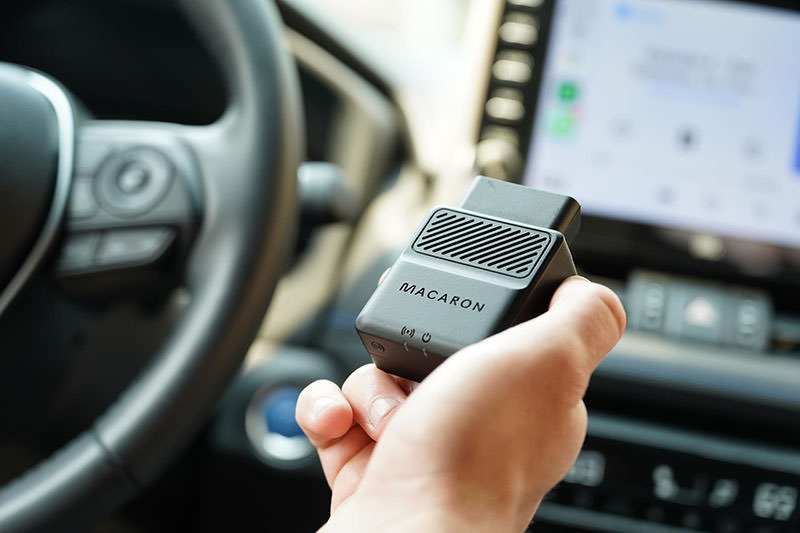
DIMO offered a special "buy one DIMO Macaron, get a second Macaron half off" Black Friday promotion. Unfortunately, the deal ended Monday, November 27th. Did you miss it? Fear not, fearless reader of the Hub, we have your back. DIMO offered a special 4 day extension just for DePIN Hub subscribers.
The deal is good through 11:59 EDT on Friday, December 1st, so hurry over there and pick one up. With two devices, you could put one in each car or gift one to a partner, friend, or family member. Head over to DIMO’s website to grab yours today!
💰 Discount Code: HOTSPOTTYBF
DePIN Hub Podcast
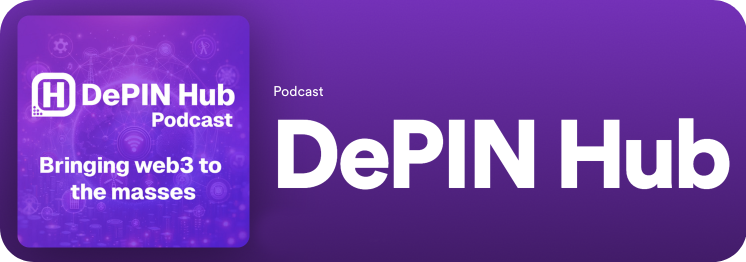
This week, we’re excited to announce the launch of the next product in the DePIN Hub ecosystem: The DePIN Hub Podcast!
Every two weeks, our host Daniel will be interviewing people from around the DePIN space, with an emphasis on projects we think you need to know about. Each episode will feature discussions with founders and team members about how decentralized networks are solving the world’s problems and how you can get involved. And remember, this is DePIN we’re talking about. Anytime you see the phrase “get involved,” it also means “get compensated,” so think of these projects as opportunities for passive income waiting to be discovered.
This week, our first episode features Remy Gierech, founder of a project called 2blox. 2blox is a new project that helps urban planners around the world with a network of IoT devices and a new mobile app - and you can easily get involved.
Curious to learn more about how you can participate? Read on for a quick summary then follow the link to hear the episode below.
Fixing the city with DePIN
If you want to understand 2blox, take a second to think about traffic. Where does it come from, and what can we do about it?
Sometimes it’s caused by an act of God - if there’s an accident or a tree in the road, there’s not much anyone can do to prevent it, and the cars will probably back up for a while until the road is cleared.
Oftentimes, though, congestion is a man-made problem. The flow of traffic depends on how efficiently roads are laid out, and it can be mitigated by intelligent design. Which streets should be one way? Where should we place public parks? One street may be 55 mph, but drop a playground on it and you might have to reduce the speed limit to 25. Think of the amount of traffic that could be created because of one poorly thought out decision.
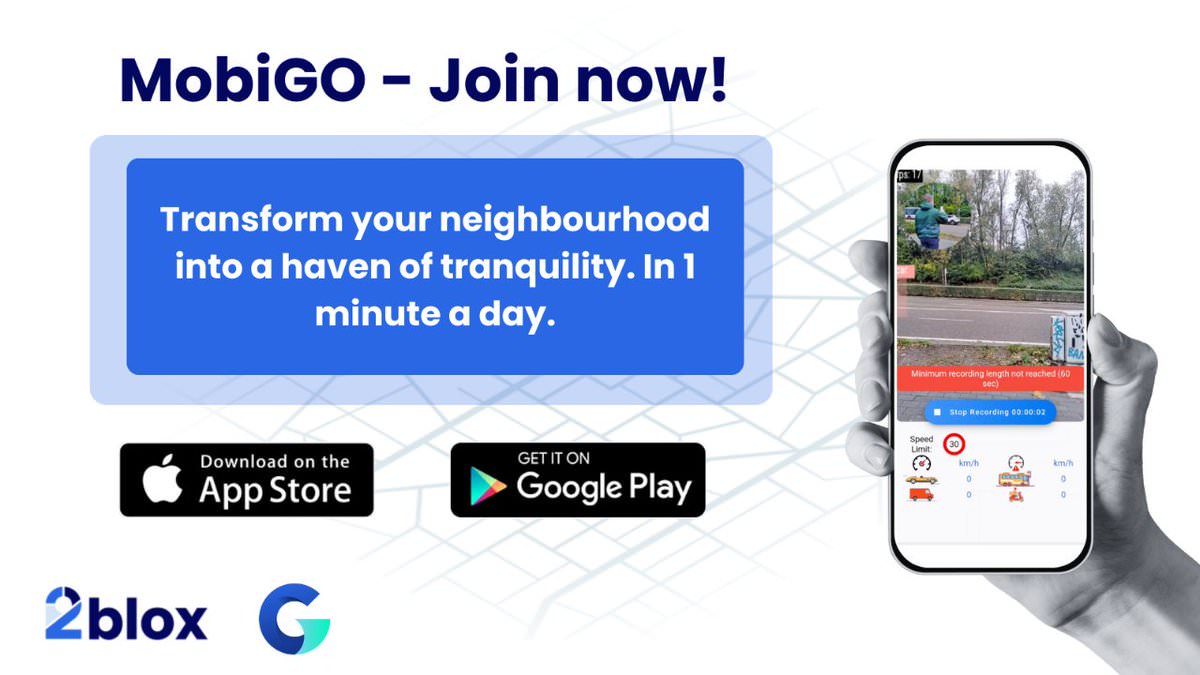
The question is, how can urban planners make decisions that produce the safest and most efficient cities possible? What would help to improve the process?
Like almost every other situation in the world, there’s a one word answer: data.
When urban planners know which streets are crowded at which times of day, they can plan accordingly. This could be data about the average speed in certain locations, the level of congestion, or what types of vehicles are on the road at what times. This is all referred to as mobility data, and it’s exactly what 2blox is designed to provide.
Essentially, 2blox offers a network for recording street footage and transmitting the data to city planners. Originally, this involved a legion of small IoT devices with 4K cameras, designed to be pointed at active roadways. Today, however, 2blox has rolled out their new MobiGo app 📱, and any smartphone can use its image recognition software to count and track the number of objects on the road. Users like you can mount a phone on their car windshield, where it will measure the number of cars, pedestrians, and other vehicles on the road, as well as the speed of all of these parties.
What’s the outcome?
The outcome is a wealth of data about how citizens use the city’s roadways, which is provided directly to the municipality itself. It results in a city that is more informed of its citizens’ needs, safer and more efficient roads, and a source of passive income for anyone who helps out by joining the network.
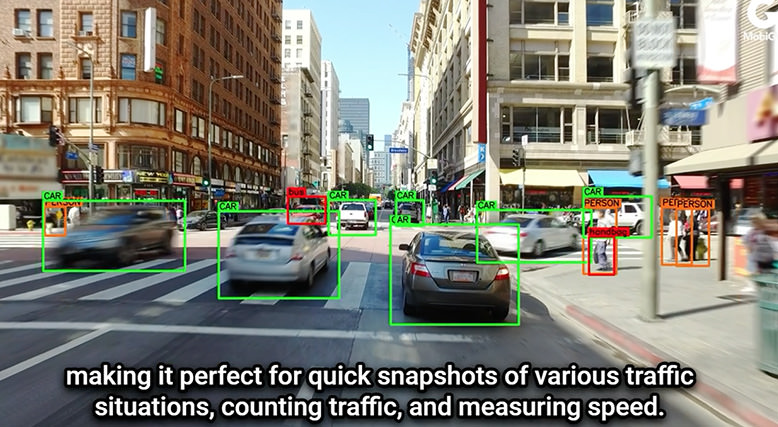
The guys cover a lot of ground in the full episode, which you can check out on YouTube and Spotify by clicking the links. If the project sounds like something you’d like to participate in, you can download their new MobiGo app on your smartphone. The mobile app was just released recently, so tell them congratulations if you get the chance!
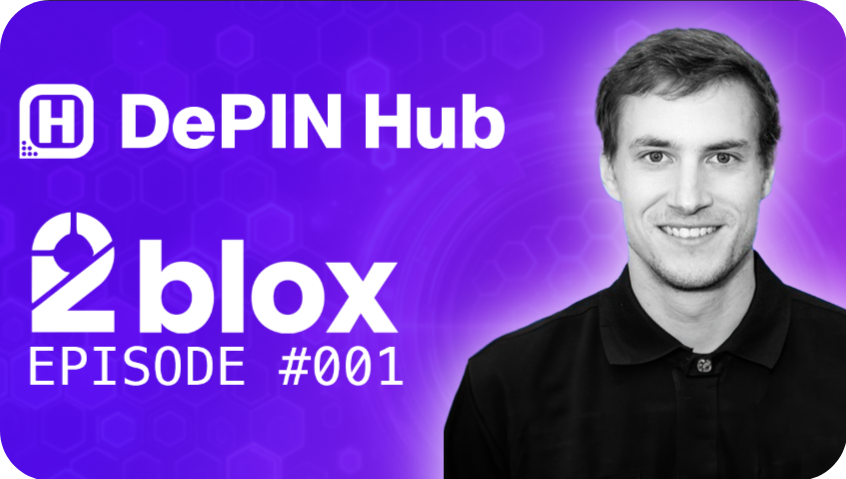
Upcoming Episodes
If you like what you’ve heard today, there is plenty more where that came from. We’ll be releasing podcast episodes over the next month or so featuring a number of exciting projects currently building out decentralized infrastructure networks. Here’s a quick preview of a few of them, so you know what’s in store:
Streamr
As IoT devices are incorporated into our lives more and more, real-time data streaming becomes increasingly important. Consider a few examples: Agricultural sensors can measure soil moisture on a farm and trigger an irrigation device when plants need watering. A traffic light can change in response to the number of cars lined up, rather than waiting for a crude timer. Health monitoring devices can stream biometric data to healthcare providers, alerting them when a patient is in need.
All of these examples depend on information being broadcast either to or from a smart device, and this distribution of data must occur on a dedicated network. Streamr is that network, and it has the potential to be the backbone for the entire planet’s data economy. In an upcoming episode of the podcast, we’ll be chatting with the founders about the benefits of decentralization and the future of the tokenized data economy.
Grass
For AI models to be trained, they need to parse through massive amounts of data from public websites to learn how humans speak and reason. Simple enough, but how do they access those websites?
Grass is a new DePIN project that lets users sell their unused internet bandwidth to these labs to be used for scraping data from the web. Think of it like your internet connection becomes a VPN when you’re not using it, and ChatGPT can use it to check Twitter while it studies human language. Stay tuned for an upcoming episode of the podcast with the founder of this new, AI-focused DePIN project.
Dimo
Do you drive a car? DIMO makes devices that plug in under your steering wheel to transmit information about your vehicle’s health to a variety of stakeholders. It helps insurance companies, repair shops, and fleet owners in planning a car’s maintenance expectations, and also gives you valuable, up-to-date information about your car’s performance.
This is one of the highest paying passive income opportunities in DePIN, and it takes literally no effort. Just plug the device in and start to earn. We’ll be speaking with members of the DIMO team very soon, so stay tuned for this episode in the coming weeks.
New episodes of the podcast will be recorded every two weeks, and we’ll feature a section on the website where you can track them all down. For now, go ahead and subscribe on Spotify and YouTube to get updates whenever new episodes are released!
Checkout out our podcast links:
▶️ YouTube: https://bit.ly/depinhub-podcast-youtube
🎶 Spotify: https://bit.ly/depinhub-podcast-spotify
Meet Hotspotty's Newest Partner - ATOR
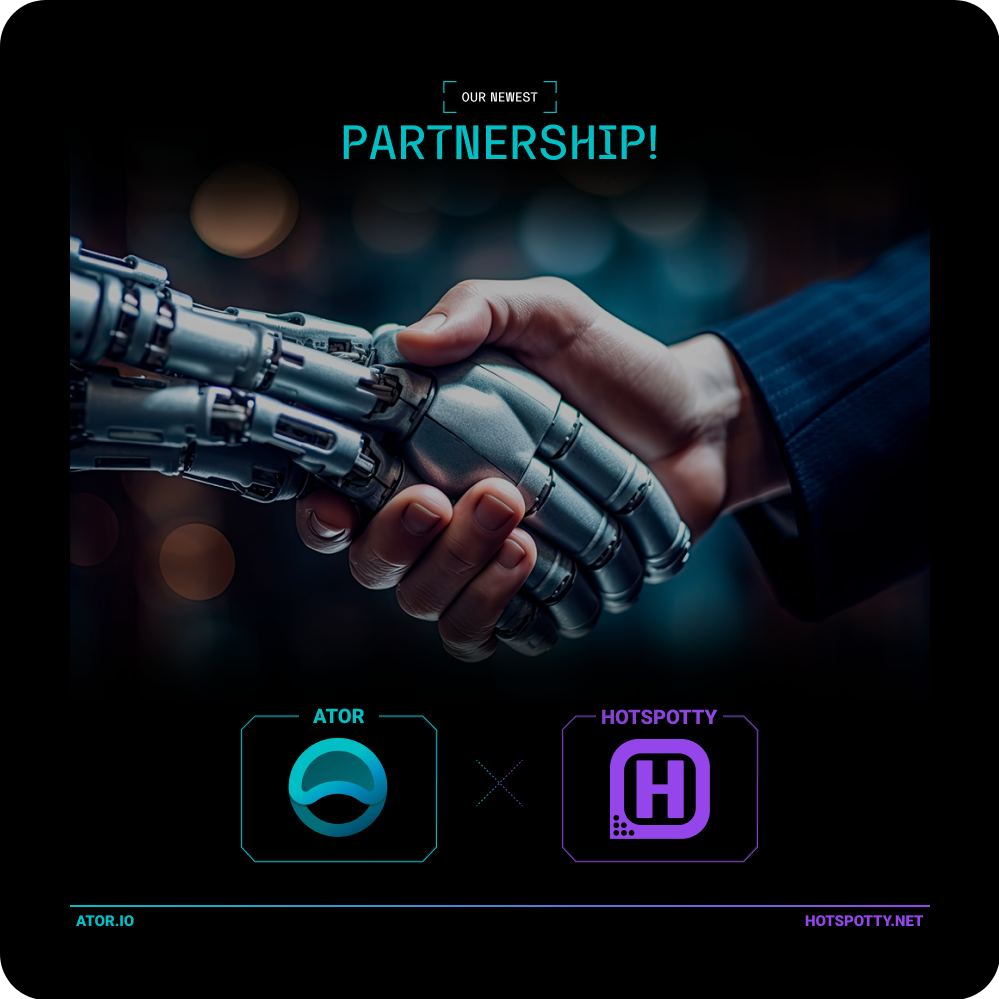
If you take data privacy seriously, you’re probably familiar with a browser called TOR. Designed to provide users with total privacy and anonymity, it uses a few different methods for keeping activity safe from prying eyes.
The most important of these is the network of nodes through which it routes all internet traffic. When you visit a website on TOR, your traffic is routed through the internet connections of a series of volunteers, who provide nodes or “relays” that encrypt all data before sending it on through the network. This has the dual impact of masking your IP address and concealing your actual activity, and it all depends on these volunteer node providers.
Enter ATOR. ATOR is a decentralized network that uses token rewards to incentivize users to provide these TOR relays. Until a week ago, nearly 2,000+ of them were dedicated to the cause, at which point TOR decided this posed a form of centralization risk, to say nothing of the fact that its lofty ideals as a volunteer network were somewhat compromised by the introduction of for-profit node provision. The ATOR relays were summarily removed from the network.
ATOR, in response, decided to hit the nuclear button: they decided they would just make their own network.
In addition to the thousands of people already participating, ATOR plans to release its own proprietary hardware for offering relays, also taking advantage of one crucial detail: you can run a node on most of the hardware available for any existing DePIN network. That’s right - if you own a Helium miner, for example, you already have all the equipment you need to start mining $ATOR.
Today, we’re very excited to announce that Hotspotty and DePIN Hub are partnering with ATOR to provide education and spread the word about this exciting new development 🤝. We need to stress that this is a BIG deal. We believe there will be a ton of projects using the network in the future, and ATOR is poised to accomplish everything TOR has with levels of decentralization (read 'massive scale in relay nodes') that the old network never achieved. To us, it’s the perfect example of tokenized DePIN networks triumphing over previous network models, and we’re thrilled to be along for the ride.
You can get caught up on the saga so far by listening to the AMA Twitter space that ATOR recorded, but we will definitely be keeping you in the loop about this in the future. 🎧🔄
